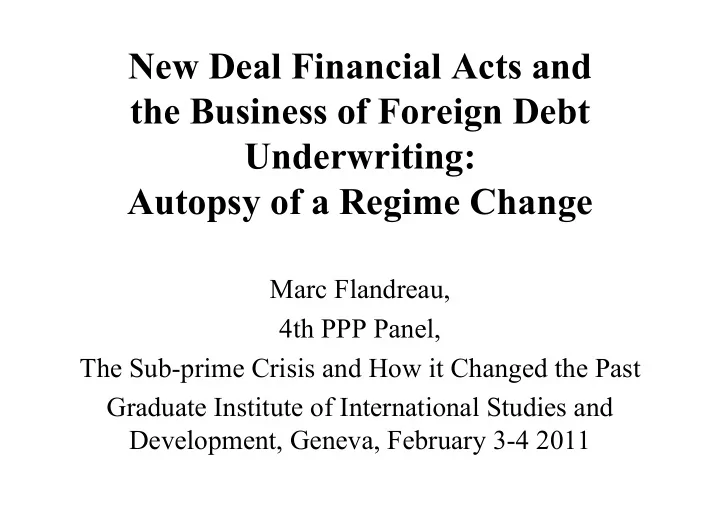

New Deal Financial Acts and the Business of Foreign Debt Underwriting: Autopsy of a Regime Change Marc Flandreau, 4th PPP Panel, The Sub-prime Crisis and How it Changed the Past Graduate Institute of International Studies and Development, Geneva, February 3-4 2011
Bottom line: What we know about the interwar • Conventional narrative: bad bankers, do lots of bad things: – “too much competition” – robbing of Tom, Dick and Harry – Market failure ends up in abject bond debacle – Shut down of global capital markets as a result – Need for new system: Bretton Woods is the solution (rise of multilateral institutions etc) • More recent amends (Lindert, Eichengreen, Portes) – Not so quick: recovery rates not so bad – Think of institutional mechanisms (bondholders) – Dangers of creating a government sponsored body (case of US FBPC, created 1933, vs British CFB, created 1868)
What I do: Reorganize a Narrative of Interwar Foreign Debt Disaster • Discuss earlier regime of underwriting/certification in London • Discuss New York transplant=>honest bankers? • Think of effects of Glass-Steagall • Show that they were disruptive: – crowding out of reputable capital – Levelling off of informational advantages – Dismantling of loyalties • Role of New Dealers in changing system
The old regime of relationship banking • Signalling (good banks do good loans, Flandreau & Flores 2009) • Control (conditionality lending Flandreau and Flores 2011) • Trouble shooting (no correlation across good securities Flandreau and Flores 2009) • Politics or the Polanyi connection (Rothschilds prevent wars, do diplomacy, create states: Belgium, Finland: Flandreau and Flores 2010)
Why? • Credible promises: protect reputation – The Spence connection • Market share: high cost to misbehaviour – The Gorton connection • Role of capital as a sunk cost – The Sutton connection
Figure 1. Capital in Two Leading Merchant Banks
Outcome • Tier-ing of the market: good stuff and the rest is for consenting adults (Rothschilds in Commission 1875) • Q. 5789. … Supposing a loan were offered for the Khan of Khiva, or for any of those States, you would not suppose that that was a good Government; and anybody who subscribed to that loan must know that he is subscribing to a loan which is utterly worthless. • Explains why limited problems • Explains persistence (Rothschilds at the helm) • Explains why certain crises are important (Barings?) • Explains why you don’t need the Navy, and why CFB are not really important.
The New York transplant • Difficulties in London • Role of the House of Morgan: they do domestic certification, and they try break in in the foreign debt market; WWI is an opportunity.
Table 1. The Overseas Loan Embargo in London: A Chronology (1918-1931) Period Controlling Agent Extent 1918-Nov 1919 Capital Issues Committee Most Overseas Issues 1920 Bank of England Overseas government issues and foreign cy loans 1921-Feb 1924 Bank of England Short and medium term foreign government and cy loans Feb 1924-Nov 1924 None Free Nov 1924-June 1925 Bank of England Foreign government loans June 1925-Nov 1925 Bank of England Colonial and foreign government loans Nov 1925-Mid 1929 None Free Mid 1929-May 1930 Bank of England Foreign government and foreign company loans May 1930-Sep 1930 None Free Sep 1930-1931 Bank of England Foreign loans extending to most issues in 1931
Figure 2. Foreign Issues in London and New York 1920-1929
New York, the new London? • Bankers said so. Kahn (Senate Hearings): I think that the banker is called upon to exercise a greater degree of care than pretty nearly anyone else who is dealing with the public, because he is dealing with a commodity as to which he is considered to be an expert adviser and as to which many people rely on his integrity. Sen. Johnson: And judgment? Kahn: His integrity and judgment […] He must resolutely decline, whatever be the monetary inducement, to attach that trademark and that responsibility to any securities as to the soundness of which there is, or ought to be, any doubt in his own mind. If he does not do all that, he is not the kind of banker that deserves to live.”
Table 2. Market shares, Default Rates, and Capital Stock of New York Underwriters Market Share (a) Performance: (Own Default Average Capital Stock Rate)/(Others’ Default Rate) (b) Mo USD (c) JP Morgan 31% 0.26 94 City Company 13% 0.74 22.5 Kuhn, Loeb 6% 0.57 21.5 Guaranty Company 6% 0.54 [10] (d) Others (average) 1% 1 n.a.
Figure 3. Delivering Value: Deals, Underwriters and Performance in the New York Market
Benchmark comparison: London in the 1870s
New Deal Financial Acts • Glass-Steagall: separation of commercial and investment banking: – Underwriting – Deposit taking • Amended Securities Act and Securities Exchange Act – Increase transparency – Increase liability
Figure 4. Available Certification Capital from Four Most Prestigious Underwriters (Millions USD)
Consequence • Move to a new business model where underwriters are more like brokers • Rise of competition in underwriting (Flandreau, Flores, Gaillard, Nieto-Parra (2010): from “Very monopolitistic” before 1931 to “very competitive” today • Rise of the prime brokers • Permits the transformation of joint stock: more moral hazard
Figure 5. Monthly Defaults on Foreign Debts 1930-1942
Political roots of the regime change • Shift of power from bankers to the US administration • Explains important feature of the new order • Politics rule (Walter Lippman)”T he Morgan Inquiry”: • “The only check upon [Morgans] has been the conscience of the form and its banking tradition. Now the possession of such a great power by private individuals who are not publicly accountable is in principle irreconciliable with any sound conception of a democratic state. ”
Recommend
More recommend